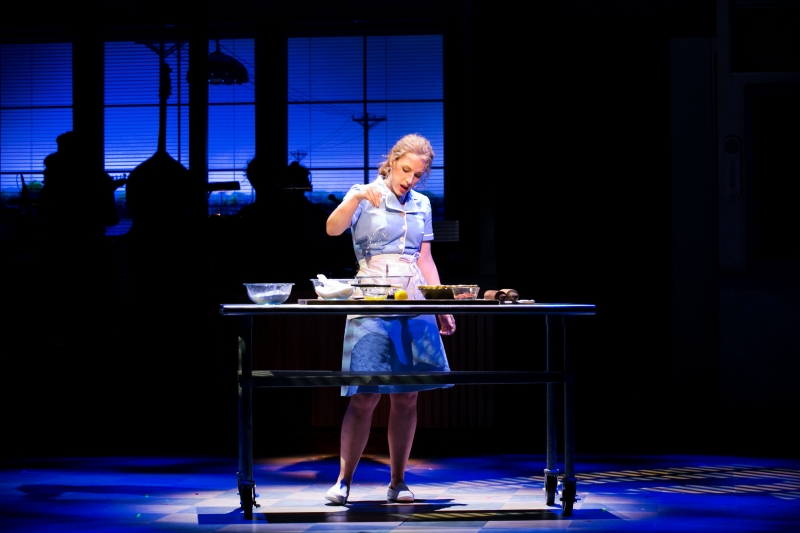'Waitress,' Key Ingredient to Success is a Strong and Skillful Team of Women
Bridget McCarthy ’17 / Emertainment Monthly Stage Editor

On Thursday August 20, Waitress had its official opening at the American Repertory Theatre in Cambridge, MA. Based on the 2007 Oscar-nominated film by the late Adrienne Shelly, Waitress tells the story of Jenna, a small-town girl with the title job at a southern diner. Trapped in a possessive relationship with her abusive husband, Earl, Jenna finds release in baking signature pies; but her treats go beyond just tasting delicious.
Jenna’s pies are a work of art, baked with the same emotion that any painter, writer, or poet would create with. An unexpected pregnancy with her abusive husband and an impulsive affair with her gynecologist lead to some of Jenna’s most inventive pies, like “I Don’t Want to Have No Baby With Earl Pie,” and “Naughty Nutty Pumpkin Pie” for her forbidden lover, Dr. Pomatter.

At its core this story epitomizes feminism. It shows a woman’s ability to overcome an abusive relationship and reclaim her independence. Sisterhood trumps any love-interest as Jenna’s fellow waitresses, Dawn and Becky, also struggle to find fulfillment, supporting each other through it all.
Coming off her Tony-winning performance as Carole King in Beautiful: The Carole King Musical, Jessie Mueller continues to prove her skill and incredible versatility as a Musical Theatre actress. Carousel, Fiddler on the Roof, Beautiful, and now Waitress – Mueller’s resume is a show-and-tell to any employer or audience member that she can quite literally do it all; and do it well. From classical ballads in Carousel to the popular hits of Beautiful, it comes as no surprise that Mueller has taken on the soulful, pop/rock stylized singing in Waitress with ease, and boy, does she execute.

Although Mueller’s performance is career-defining, the show would be nothing without its tight ensemble. The entire cast has stuck true to the impassioned and distinct music of Sara Bareilles, showcased in the number “Opening Up.” With an onstage orchestra, the ensemble also acts as an added instrument, sitting near the piano for certain songs to add percussion by clapping. This sort of laidback but purposeful incorporation is similar to a concert rather than a musical, representing the cast’s dedication to the funky music Sara Bareilles has provided.
Jeanna de Waal (Kinky Boots, American Idiot) and Keala Settle (Les Mis, Hands on a Hardbody,) give a backbone to the girl-power that fuels this production. As Jenna’s best friends Dawn and Becky, de Waal and Settle are anything but sidekicks. Each character, and each voice for that matter, can very much stand on its own, a fact proven to the audience in each woman’s solo song, “When He Sees Me” and “I Didn’t Plan It.”

But it is Bareilles’ music that makes the show. The songwriting adds a powerful female voice, something Waitress could not have survived without. Bareilles stayed true to her style, and it translates smoothly onstage, fitting in seamlessly with the story’s feminist tone. Bareilles’ music matched with the book by Jessie Nelson is a dream-team. Both women add a dialogue to the stage that captures the vision of the late Adrienne Shelly’s film, from which the musical is based. Although the move from stage to screen is a huge undertaking, Nelson and Bareilles have worked together to stay true to the mood of Shelly’s masterful movie – something that could have only been expressed by two women equally as strong-minded and talented as Shelly herself.
The set design by Scott Pask pulls from the same playful charm as the film. The curtain made entirely out of pie is reminiscent of the whimsical stop-motion scenes depicting Jenna’s pie creations coming to life. The set isn’t over the top but it is intricate, with rotating pieces that change the scene from restaurant to Jenna’s home kitchen. Lighting by Ken Posner shows dawn and dusk coming through the windows of the diner, giving the audience a realistic 9 to 5 day of a busy waitress.

This past Broadway season the musical Fun Home made history when it became the first show to have an all-female writing team win the Tony. The tradition could possibly continue this spring when Waitress makes its jump to the Great White Way in April 2016. Whether it wins awards or not, just the existence of Waitress is solidifying the importance of theatre about women being told by women. Rock on, ladies.
Until it starts previews at the Brooks Atkinson Theater on Broadway in March, Waitress will continue its run at the American Repertory Theater through September 27th.